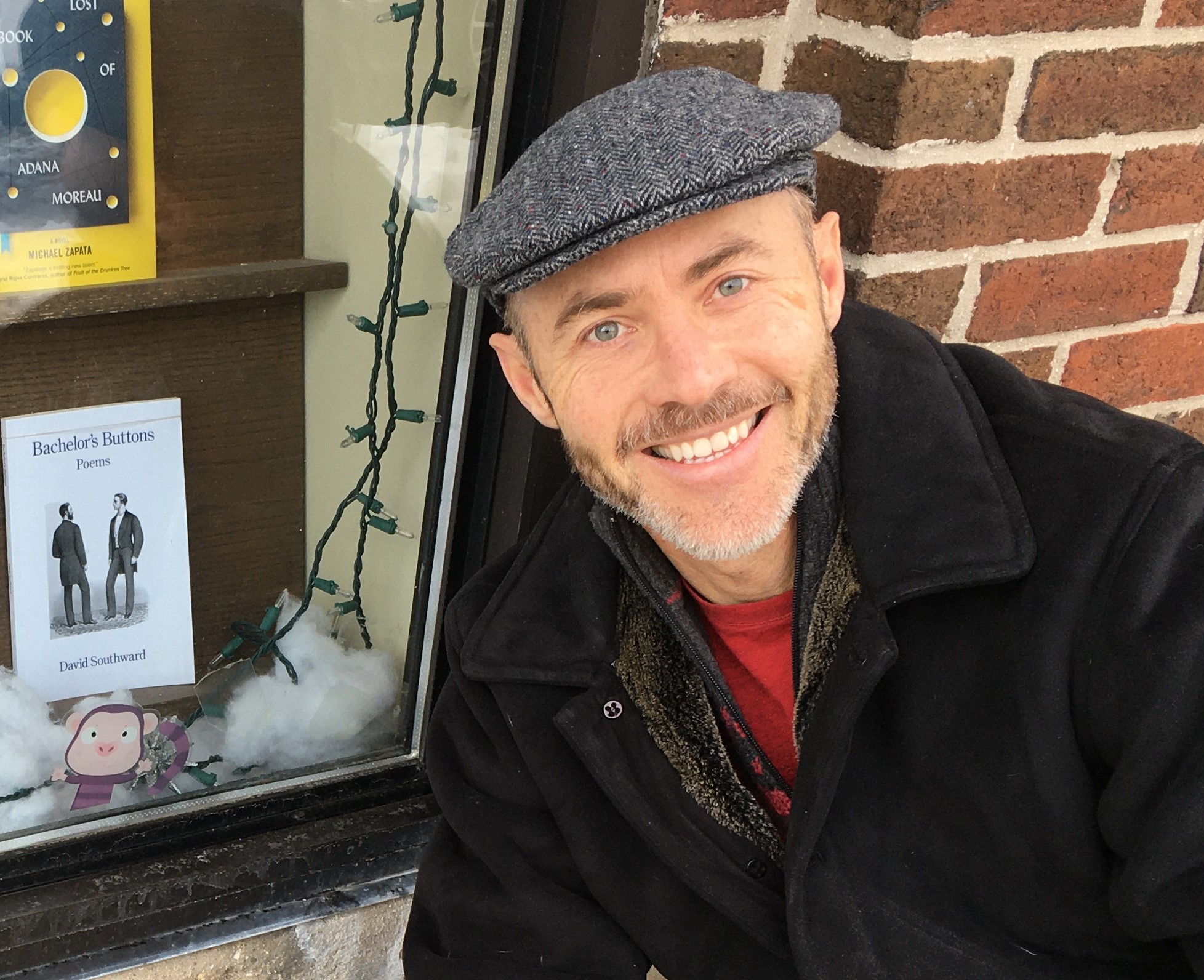Poetry Month Spotlight
David SouthwardMessage in a Bottle
As a kid in the 1970s, I was addicted to reruns of ’60s sitcoms. Shows like Bewitched, The Flying Nun, and most especially I Dream of Jeannie featured magical women whose mischievous powers seemed rooted in their femininity. The men they loved were always trying to control or suppress these powers. A queer boy like me could identify with the predicament of having to hide one’s sexual magic.
Jeannie’s hiding place was her bottle. An ornate Arabian decanter housing her miniaturized bedchamber, its interior was opulent yet intimate—a rich Orientalist fantasy of velvet cushions and curvaceous walls. Whenever Jeannie turned into smoke to enter the bottle’s narrow opening, I desperately wanted to follow. Her magenta lounge looked so chic and fun, so different from my drab suburban world, so safe from judgmental eyes.

I drew countless pictures of Jeannie’s bottle in a stenographer’s notebook, always adding slight variations to its design. (I could never get a close enough look at its details on our black-and-white Zenith). The bottle became my talisman: a jewel-toned objet d’art with mysterious intricacies, whose erotic significance I must have intuited, so obsessively did my imagination return to its suggestive shape.
In a way, those drawings were my first poems. They were early attempts to share the instinct for beauty, love of form, and earnest playfulness that continue to motivate my writing. I want every poem to become a little world of layered meanings for its reader—a decorous, sparkling haven from which to contemplate even painful realities. There, taking refuge from the moral police, my imaginary reader and I briefly come together through the magic of words—in the one theater where every wish can be granted.
I’ve chosen three poems from my new collection, Bachelor’s Buttons (Kelsay Books 2020), to represent both my formal and free-verse moods. “Macramé” looks back to a weaving fad that every kid of the ’70s remembers; my math-teacher father quickly became something of a master at it. “Nipples of Men” celebrates the diversity and absurdity of those overlooked organs. And “Working (It) Out with Teena Marie,” a gym reverie in terza rima, pays homage to a pop/R&B legend who left us too soon—and whose signature hit made an indelible mark on my teenage psyche.
Macramé
Mom enrolled
in an evening class,
botched a butterfly on wood block
and muscled through
hours
of gnarled yarn
dangling from a driftwood stake,
before giving up.
But you,
Dad, discovered
you had a knack for macramé.
Looping her leftover
jute
round a hook
in the ceiling, you braided coarse
helixes that split—
tapering
into bored corners
of mahogany (shelves for our unlit
incense and potted
Dieffenbachia);
then tied it all together
with a graduate’s tassel. Your multilevel
Eiffels filled our house
with math
done strictly for pleasure.
From the carpet I salvaged scraps
to make a noose
or lasso.
Nipples of Men
Not quite tits
or teats, just pectoral points
of interest: a torso’s eyes
caught staring
at the beach; pinpricks
disturbing a taut Oxford’s
cotton; coppery beacons
appearing through sheer Ts.
Aureoles varying
like fingerprints—in diameter
from clamshell to dime, in tint
from plum to pink—each
with its own punch code
of goosebumps. Sensitive
to the barest hints
of coolness in blood
or air flow, they shrivel
like witches
in water, hibernate
in whorls of hair. Whether hubs
of ecstasy or indifference,
bashful paps or rubbery
dugs—pierced, thick
as toothpaste—they are
unmistakably a man’s
most naked part. Impractical
glands, sore reminders
of what he can’t give,
they are the clenched petals
of him—harmless and endearing
as embarrassments
he pretends
aren’t happening.
Working (It) Out with Teena Marie
She whoops into my ears; the whole gym whirls.
I turn the volume up to shush the clink
of my elliptical machine. Like joyous squirrels
her scatted oohs and shoop-pops leap in sync
with youthful biorhythms now gone slack.
And she’s been dead how long? Five years, I think,
letting the iPod’s witchcraft take me back
to summers in Ft. Myers: bored, sixteen,
racing my bike down streets whose hot shellac
exuded waves of harsh, phenolic steam.
Clipped to my shorts, a tape player filled my head
with pop sensations. Warnings to come clean
pursued me through desire’s infrared.
I saw the manly shadows moving nearer;
I pounded harder, like a thoroughbred.
These boys who curl their biceps in the mirror:
what are they after? Strength won’t make them freer
pullers of Beauty’s drawstring. Do they fear her
because they sense how good it feels to be her?
Fanned by an AC vent, I bounce and hurtle
past them through time—a stationary skier
for whom the trails of memory unfurl
this chorus, like a plaintive reprimand:
I just want to be your lovergirl.
About David Southward
David Southward teaches in the Honors College at the University of Wisconsin-Milwaukee. His chapbook, Apocrypha (Wipf & Stock 2018), reimagines the life of Jesus in a series of sonnets. Bachelor’s Buttons (Kelsay Books 2020) is his first collection. David lives in Milwaukee with his husband, Geoff. Read more at davidsouthward.com.
Bachelor’s Buttons available at:
Boswell Book Co. in Milwaukee | Kelsay Books | Amazon
Apocrypha available at:


BMP Celebrates National Poetry Month
For this year’s National Poetry Month at BMP Voices, we seek to celebrate the ways in which we’re interconnected — highlighting community, gratitude, and the ways in which creativity redounds upon itself, fed by collective energy and goodwill. Our fee-free contest is open to all styles and forms of poetry, with an eye toward our mission of discovering voices that are immediate, immersive, and urgent. Poems inspired by the work of others are welcome. We also welcome poems written to other poems or poets.
